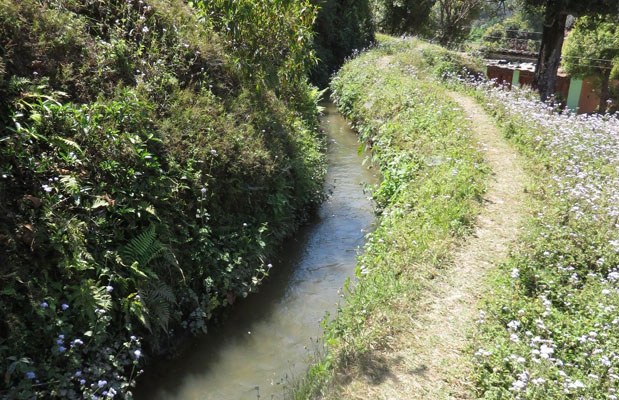Contact Person: Anjal Prakash
Type: Roundtable
 Water flowing through the irrigation canal in Bagaicha, Chaughada VDC, Nuwakot, Nepal.
Water flowing through the irrigation canal in Bagaicha, Chaughada VDC, Nuwakot, Nepal.
Photo: Sangita Dandekhya/ICIMOD
Nepal is well known for its tradition of farmer managed irrigation systems (FMIS). In this system, farmers are collectively engaged in irrigated agricultural development as an enterprise. Numerous FMIS in Nepal ranging from high lands to mid hills and the terai region, provides irrigation services to about 70 percent of the country’s total irrigated area of over of 1.2 million ha. Most of the FMIS are location-specific, indigenous in their management practices and representative of the local organizational needs and services to deliver. FMIS symbolizes grass root democratic institution where community takes responsibility for natural resource management and allocation. Nepal’s FMIS have autonomous operational characteristics, providing basic hope for the sustainable management and development of the nation’s natural resources wherein water is the most precious resource (FMIS Trust, Nepal).
In recent times, FMIS has been recognized as a climate resilient system that has survived for years and provided relief to farmers due to changing climatic conditions. However, due to recent changes in the socio-ecological systems, FMIS has come under increased pressure. Some of the systems are defunct while others are facing problems in operation and maintenance. There is an increased groundwater usage in the command area in the terai region and farmers are experiencing reduced flow of water systems.
In order to understand this issue further, ICIMOD is organizing a roundtable titled “Farmer Managed Irrigation Systems (FMIS) at the Crossroads: Mapping Climate and Socio-Ecological Challenges” on 11 March 2016 from 2:00 to 4:30 pm at the ICIMOD headquarters in Kathmandu, Nepal.
